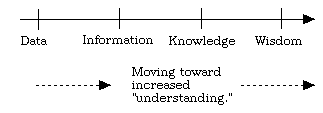| << Chapter < Page | Chapter >> Page > |
The content of the human mind can be classified into four categories:
Data
Data consist of raw facts and figures - it does not have any meaning until it is processed and turned into something useful.
Data comes in many forms; the main ones are letters, numbers and symbols.
Data is a prerequisite to information. For example, the two data items below could represent some very important information:
DATA INFORMATION
123424331911 Your winning Lottery ticket number211192 Your Birthday
An organization sometimes has to decide on the nature and volume of data that is required for creating the necessary information.
Information
Information is the data that has been processed in such a way as to be meaningful to the person who receives it.
INFORMATION = DATA + CONTEXT + MEANING
Example
Consider the number19051890. It has no meaning or context. It is an instance of data.
If a context is given : it is a date (Vietnamese use French format ddmmyyyy). This allows us to register it as 19th May 1890. It still has no meaning and is therefore not information
Meaning : The birth date of Vietnamese President Ho Chi Minh.
This gives us all the elements required for it to be called 'information'
Knowledge
By knowledge we mean the human understanding of a subject matter that has been acquired through proper study and experience.
Knowledge is usually based on learning, thinking, and proper understanding of the problem area. It can be considered as the integration of human perceptive processes that helps them to draw meaningful conclusions.
Consider this scenario: A person puts his finger into very hot water.
Data gathered: The finger nerve sends pain data to the brain.
Processing: The brain considers the data and comes up with...
Information: The painful finger means it is not in a good place.
Action: The brain tells finger to remove itself from hot water.
Knowledge: Sticking the finger in hot water is a bad idea.
Knowledge is having an understanding of the "rules".
The terms Data, Information, Knowledge, and Wisdom are sometimes presented in a form that suggests a scale.

Information processing is the change (processing) of information in any manner detectable by an observer. Information processing may more specifically be defined in terms by Claude E. Shannon as the conversion of latent information into manifest.Input, process, output is a typical model for information processing. Each stage possibly requires data storage.
Now that computer systems have become so powerful, some have been designed to make use of information in a knowledgeable way. The following definition is of information processing

Notification Switch
Would you like to follow the 'Introduction to computer science' conversation and receive update notifications?